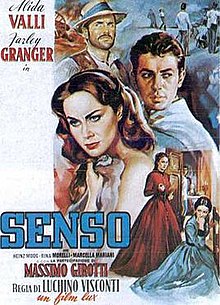Senso (film)
| Senso | |
|---|---|

Theatrical release poster
|
|
| Directed by | Luchino Visconti |
| Written by |
Carlo Alianello Suso Cecchi d'Amico Giorgio Bassani Luchino Visconti Giorgio Prosperi |
| Starring |
Alida Valli Farley Granger Heinz Moog Massimo Girotti Rina Morelli Christian Marquand Marcella Mariani |
| Music by | Anton Bruckner from Symphony No. 7, adapted by Nino Rota |
| Cinematography |
G.R. Aldo Robert Krasker |
| Edited by | Mario Serandrei |
| Distributed by | Lux Film |
|
Release date
|
30 December 1954 |
|
Running time
|
117 minutes |
| Country | Italy |
| Language | Italian |
Senso is a 1954 melodrama film, an adaptation of Camillo Boito's Italian novella Senso by the Italian director Luchino Visconti, with Alida Valli as Livia Serpieri and Farley Granger as Lieutenant Franz Mahler.
Originally, Visconti had hoped to cast Ingrid Bergman and Marlon Brando in the lead roles, but Bergman was not interested in the part, and Brando was nixed by the producers who considered Granger a bigger star at the time. Both Franco Zeffirelli and Francesco Rosi, later accomplished film and theater directors in their own right, worked as Visconti's assistants on the picture.
Senso is set in Italy around 1866 the year the Italian-Austrian war of unification would see the Veneto and most of Friuli-Venezia Giulia united to Italy after the Seven Weeks' War between Austria on one side and Prussia and Italy on the other. The story opens in the La Fenice opera house in Venice during a performance of Il Trovatore. At the close of Manrico's rousing aria Di quella pira, the opera is interrupted by a boisterous protest by Italian Nationalists against the occupying Austrian troops present in the theater. Livia Serpieri, an Italian countess, unhappily married to a stuffy older aristocrat, bears witness to this and tries to conceal the fact that her cousin Marquis Roberto Ussoni has organized the protest. During the commotion, she meets a dashing young Austrian Officer named Franz Mahler, and is instantly smitten with him. The two begin a secret love affair. Despite the fact that Franz was responsible for sending Roberto into exile for his radical behavior, Livia vainly pretends not to be aware of it.
...
Wikipedia
